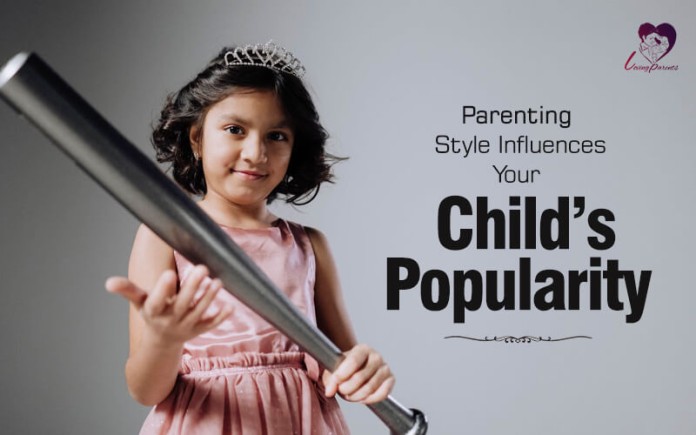The developmental psychologists have been interested for a long time in how parents affect the development of their children. However, finding actual cause and effect that links between the specific actions of the parents and the later behavior of the child is quite difficult. Let us understand how different parenting style influences your child’s popularity and also the effects of parenting style.
Some of the children are raised in a dramatic and different environment and later grow up to have a remarkably similar personalities. Conversely, children who share a home and are raised in the same environment are grown up having very different personalities.
Despite all these challenges the researchers have posited that there are links between the parenting styles and these style effects on the children. And some of them also suggest that these effects carry over into adult behavior.
Many parents worry that their children will be well accepted by their peers once they start going to preschool and elementary school. The new research shows that parenting styles can influence your child’s popularity. What do you think, is popularity a goal worth for a child to pursue?
Read Also: Environment Friendly Activities You Can Teach To Your Kid
Your parenting style will definitely be going to affect everything from how much your child weighs to how they feel about themselves. It is important for a parent to ensure that their parenting style is supporting healthy development and growth because the way in which you interact with your child and how you discipline them will influence the rest of their life.

Researchers have noticed these four types of parenting styles (while trying to understand how parenting style influences your child’s popularity):
- Authoritarian
- Authoritative
- Permissive
- Uninvolved
Authoritarian Parenting
Does any of these statements sound like you?
- When it comes to following rules, you always believe that it’s “my way or the highway”
- You believe that kids should only be seen and not heard.
- You don’t take your child’s feelings into consideration.
If you sound any of these then you might be an authoritarian parent who believes that kids should only follow the rules without any exception.
Does any of these statements sound like you?
- You tend to explain your reasons behind the rules.
- You enforce rules and give consequences, but also take the feelings of your kid into consideration.
- You put effort going to an extent into creating and maintaining a positive relationship with your child.
If all these statements sound familiar to you then you might be an authoritative parent who has rules and uses consequences but also takes their children’s opinions into account. While making it clear that they are ultimately in charge they also validate their children’s feelings. This is how parenting style influences your child’s popularity.
Permissive Parenting
Does any of these statements sound like you?
- You don’t give consequences very often.
- You think that your child learns best with little interference from you.
- You set rules but rarely enforce them on your children.
If you are familiar with these statements then you might be a permissive parent, who are lenient and often step in only when there is a serious problem.
Does any of these statements sound like you?
- You don’t spend quality time with your kid.
- You don’t ask your kid about their school, friends, or homework.
- You rarely know where your child is and with whom they are.
And if those are the statements that sound familiar then you might be an uninvolved parent who tends to have little knowledge about their children and what they do. There are very few rules and children may not receive any guidance, nurturing, or parental attention.
How your parenting style influences your child’s popularity
- Try not to be critical : Raising a kid in an aggressive social environment can impact the popularity of the kid in the future. It will make them less likable if the kid intimidates their friends by threatening to end the friendship or spreading a rumor to get their way. This trait is commonly picked up from their homes. Studies have shown that the more warm the parent is with their 5-year old the less aggressive the kid will be at age 5. Parenting role models that are exposed to altruistic, warm, and kind can help kids develop those same qualities.
- Intervene moderately in child’s friendship : In the earlier year of kids, parenting can include facilitating socializing by arranging playdates and inviting other kids to your kid’s birthday party or any other occasion. As a child grow it becomes important to gradually take a step back and allow them to manage their own social lives and deal with the small problems they face. But remember to always remain available to talk with them about different social situations and experiences. Help them in learning to solve the problems, introspect, and manage their feelings.
- Discuss popularity : The most important parenting trick is to talk openly with the child about the two different types of popularity. Explain to them that caring about their status among their peers is something all the kids worry about but all that isn’t only a way to make them happiest. Friendships of high quality are a thing to strive for. Understanding this thing can help the kid change the way they think about popularity. Explain to them that being kind, pleasant, cooperative, and inclusive will generate likability.
The Impact of Parenting Styles
Authoritarian parenting styles generally lead to children who are proficient and obedient but they are lower in happiness, self esteem, and social competence.
Authoritative parenting styles lead to result in children who are capable, successful, and happy.
Permissive parenting styles often result in children who are low in self regulation and happiness. These children are likely to experience problems in poor performance at school and authority.
Uninvolved parenting styles are ranked lowest across all the life domains. Children under these styles tend to have a lack of self control, self esteem and are less competent than their peers.
Parents can also specifically teach children things that may seem intuitive but they aren’t, like social etiquette and reading facial expressions. And if your child is not one of the social butterflies then we would suggest encouraging them to cooperatively play competitive games until they get better at navigating the social situations. Children get along more likely when they are working together.
Parenting is always hard work but we like it and no one wants their child to be or feel like the odd one out or the one who is always picked last in the team selection. While figuring out how to fit into the social hierarchy the kid ultimately has to do things on their own, and it’s valuable at least to know that there are many ways to avoid making that process more of a challenge. And it might be a kind of a bummer to know that the unconditional love and cuddles of a parent can’t protect the kids from social bumps and bruises, they can at least help to soften the blow.
